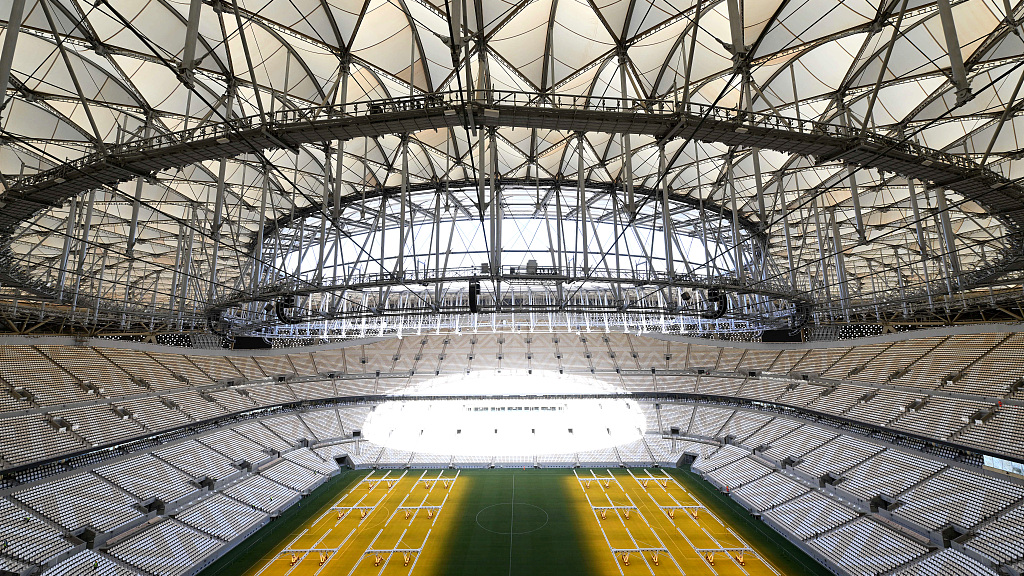
A general view inside Lusail Stadium in Lusail, Qatar, March 28, 2022. /CFP
A general view inside Lusail Stadium in Lusail, Qatar, March 28, 2022. /CFP
Editor's note: Ruqiya Anwar, a PhD scholar of Media and Communication Studies from Pakistan, is a researcher and socio-political analyst. The article reflects the author's opinions and not necessarily the views of CGTN.
As the world's focus swings to Qatar for the 2022 FIFA World Cup, the world's most renowned corporations have entered a commercial race in which Chinese corporations are among the leading players. China Railway Construction Corporation developed and built the Lusail Stadium, which will host the final game. The athletes' lodgings are energy-efficient mobile homes manufactured by a Chinese firm.
Through their sponsorships of the World Cup, several Chinese enterprises have made their international debut. Wanda Group, Vivo, Mengniu Dairy, and Hisense are the four Chinese companies listed on the official sponsor list for this year. Vivo, a major Chinese phone manufacturer, is the exclusive smartphone sponsor of the 2022 FIFA World Cup. For the previous 28 years, Dongguan Wagon Giftware in Guangdong province has been authorized to distribute and manufacture official goods for the FIFA World Cups, including replicas of the trophies for this year's tournament.
Zhou Jian, Chinese ambassador in Qatar, praised his country's contributions in the 2022 World Cup. He added that "Chinese elements are extremely prominent" and that "The Lusail Stadium has become an iconic landmark in the World Cup." "Made in China" can be found everywhere in Qatar, from the infrastructure to the telecommunications, from the 1,500 new energy buses to the solar power plants, and from the match supplies to the souvenirs. Furthermore, the huge Qatar Stadium 974 was built with the help of China's container giant China International Marine Containers. It is the first fully demountable stadium in the history of the FIFA World Cup.
Notably, the FIFA World Cup has marked the first time that new-energy buses served as the primary means of transportation. It will also be the first time that Chinese new-energy buses play an essential role at a major international sporting event. Additionally, buses, stadiums, air conditioners, and other items made in China are prominently displayed at the event, making it a great platform to highlight Chinese manufacturing. According to experts, this reflects China's crucial role in the global manufacturing industrial chain and its resistance to the effects of the pandemic.

Fans walk past the Lusail Stadium before FIFA World Cup Qatar 2022 in Lusail, Qatar, November 18, 2022. /CFP
Fans walk past the Lusail Stadium before FIFA World Cup Qatar 2022 in Lusail, Qatar, November 18, 2022. /CFP
Chinese companies contribute more sponsorship revenue to the 2022 World Cup than any other country's businesses ($1.4 billion from Chinese companies vs $1.1 billion from United States firms). Qatar's new 10-Riyal ($2.75) banknote features the Lusail Stadium, the first World Cup venue ever built by a Chinese company. Almost 70 percent of all the items used in Qatar are manufactured in Yiwu, including flags from the 32 participating countries, cheering trumpets and whistles, soccer balls, shirts, scarves, and World Cup decorations.
"Made in China" is playing a more and more important role on the global stage. Recently, the first Chinese-made high-speed trains debuted on the Jakarta-Bandung bullet train route. Many international markets have shown great interest in Chinese heating products, such as cold-resistant clothes, small gadgets, and electric blankets. Information gathered from the China Association of Automobile Manufacturers shows that the exports of new energy cars from China have surged by more than 100 percent year-over-year through the first three quarters of this year. In addition, wind power equipment, petascale supercomputers, and other Chinese items have risen to the forefront of technology.
Intelligent manufacturing is trending in China's industrial sector. Moreover, through various laws and financial incentives, the Chinese government also assists manufacturers in promoting intelligent manufacturing. Consequently, China's manufacturing sector is expanding, impacting the global industrial chain and the supply chain's stability.
China's manufacturing sector is accelerating its greening and intellectualization, which has played a crucial part in smart manufacturing under the China's Belt and Road Initiative. Additionally, Beijing plans to establish "little giants" in the realm of industrial technology, including small and medium-sized companies that specialize in a particular field and are competitive on a global scale. It also seeks to lessen its reliance on foreign corporations.
Chinese firms export products and services packed with cutting-edge technology, laying the groundwork for Chinese manufacturing to reach the global high-end product market. It will boost faith in Chinese manufacturing. The United States and other countries have also emphasized advanced manufacturing, but the development is relative slow. With the rapid integration of digital technology and production, Chinese companies will ascend the high-end value chain, transforming "Made in China" into "intelligent manufacturing."
(If you want to contribute and have specific expertise, please contact us at opinions@cgtn.com. Follow @thouse_opinions on Twitter to discover the latest commentaries in the CGTN Opinion Section.)